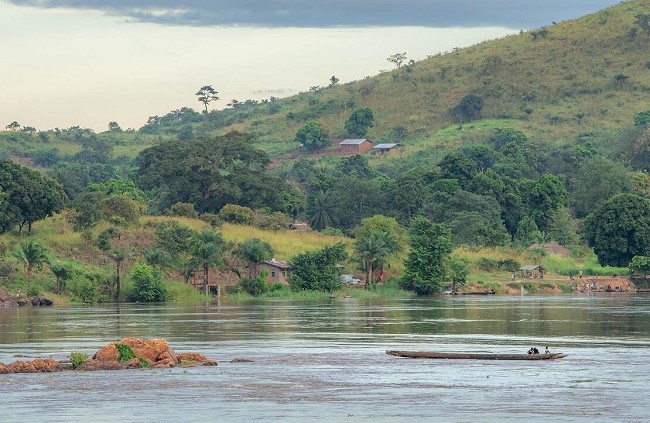Home to one of the largest tributaries of the Congo River, the Central African Republic (CAR) and the Democratic Republic of the Congo (DRC) will benefit from a pioneering cross-border initiative to prepare for extreme climatic events and develop joint water resource management strategies with $8.7 million in funding from the Global Environment Facility (GEF).

Approved on Monday, June 2, 2025, by the GEF Council, the “Regional programme for integrated water resources management in the transboundary basin of the Ubangi River between the CAR and the DRC” aims to strengthen bilateral cooperation between the two African nations while improving technical and institutional capacities for managing increasingly extreme floods, droughts and erratic rainfall patterns affecting the Ubangi River basin.
The GEF implementing agencies of the project are the International Union for Conservation of Nature (IUCN) and the African Development Bank. A regional body and two national ministries are ensuring the execution of the initiative: the International Commission of the Congo-Ubangi-Sangha (CICOS), the Ministry of Rural Development of the DRC and the Ministry of Development of Energy and Water Resources of the CAR.
Thierry Kamach, Minister of Environment and Sustainable Development of CAR, said: “The degradation of natural resources is undeniable. The United Nations 2030 Agenda is an inspiring and unifying message to build strong resilience around a transformative project that will further strengthen ecosystem interdependence for a greener and more sustainable future.”
Flowing between the CAR, the DRC and the Republic of Congo, the Ubangi stretches over 2,272 kilometres and is the main right-bank tributary of the Congo River. As such, it is part of the Congo River basin, the second-largest river basin in the world and a global biodiversity hotspot with over 1,000 fish species.
The river basin’s rainforest harbours more than 10,000 plant species and 2,500 animal species, including two-thirds of all primates, which are under pressure from deforestation and land cover clearing. In parallel, changes in hydrological regimes, riverbank erosion, sedimentation and mining pollution threaten the river’s fish and shore fauna, which are becoming increasingly rare, and the Ubangi’s role as a regulator of regional and global climates.
These challenges will be addressed by the new GEF initiative in an integrated fashion, considering the nexus between biodiversity, climate and ecosystem degradation, and between aquatic and terrestrial ecosystems.
“This initiative is vital as it brings together the communities and institutions of two countries to conserve one of Africa’s most ecologically and economically important river basins. By working across borders, these countries will strengthen their resilience to climate change while protecting biodiversity and the natural systems that sustain life,” said IUCN Director General, Dr Grethel Aguilar.
“Through its strong on-the-ground presence in the Congo basin, IUCN will mobilise actors in the forest and environmental sectors to promote collaborative basin management and community-led Nature-based Solutions at the regional, national and local levels. Our focus will be as much on biodiversity and water resources, as it will on safeguarding the livelihoods of the region’s 25 million inhabitants, many of whom depend on the Ubangi River for navigation, trade and agriculture,” Aguilar added.
“This initiative is aligned with GEF’s long-standing commitment and investments in the sustainable management of the Congo basin,” said GEF CEO and Chairperson, Carlos Manuel Rodríguez. “By funding this crucial effort in support of sustainable management of water and land resources while averting pollution and land degradation, the GEF also contributes to maintaining the ecosystem functions of this gigantic forest system in supporting the stability of the regional and global hydrological cycle.”
Over the past 30 years, changes in rainfall patterns have progressively decreased water levels and reduced runoff in the Ubangi River by up to 18%. Coupled with riverbank erosion, this further accentuated the siltation of the river, which is not only detrimental to biodiversity but also cripples navigation, limits trade and restricts access to residential areas. Alternating with drought periods, destructive floods are another harsh reality affecting hundreds of thousands of people in the region over the last decade, leading to population displacement to neighbouring countries.
The new GEF initiative will enable more effective binational cooperation in decision-making and the political monitoring of water crises by establishing a joint observatory and shared tools and data protocols between the DRC and CAR to enhance forecasting, prevention and common crisis management measures. To combat biodiversity loss caused by human activities in the river basin, practical demonstrations of nature-based solutions – such as agroforestry, conservation farming and ecosystem rehabilitation – will be carried out on site.
Ensuring social inclusivity and promoting a “whole of society” approach, the project will roll out a framework for dialogue and exchange among stakeholders, including regional and local authorities, the private sector (particularly local small to medium-sized enterprises), young professionals and female community leaders. This aims to strengthen local actors’ capability to contribute to shared watercourse management through training and capacity-building and to assist them in formulating strategies to resolve common challenges.
Anthony Nyong, Director of the Climate Change and Green Growth Department at the African Development Bank, stated: “The Bank welcomes this GEF-supported initiative to strengthen cooperation in the Ubangi basin, enhance local resilience and promote women’s leadership. Its nature-based, people-centred approach aligns with our High 5s and offers a model for basin-wide collaboration in Africa.”
With $67 million mobilised in co-financing, the GEF initiative complements a pre-existing project entitled “Regional Support Programme for the Development of Cross-border Water Infrastructure and Resources between the Central African Republic (CAR) and the Democratic Republic of Congo (DRC) – PREDIRE”, being implemented by the African Development Bank, by mainstreaming environmental, ecosystem and participative approaches into the sectors of water, agriculture and transport.
